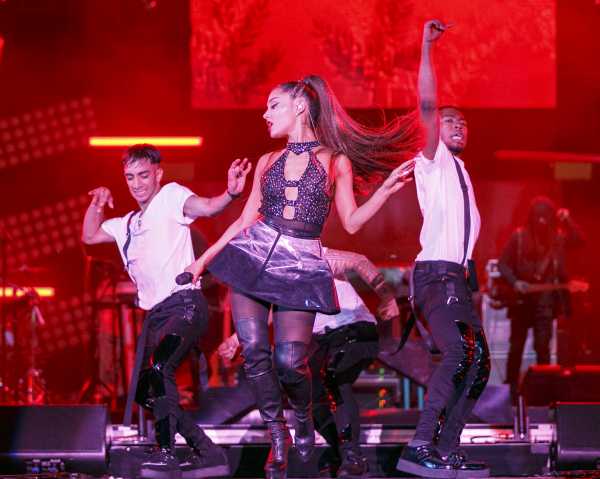
When Ariana Grande tells you she’s going to be just fine, believe her.
The sentient cupcake with a four-octave range says as much in her bouncy new kiss-off song, “thank u, next” — a farewell letter to all the men she’s loved before. And the most recent addition to that list is her ex-fiancé, Saturday Night Live cast member Pete Davidson.
The two were in love until they weren’t.
Grande and Davidson first announced their relationship in May, shocked everyone with an engagement announcement in June, and then, in the middle of October, called the whole thing off. That’s seemingly plenty of fodder for a break-up bop, but Davidson’s post-breakup behavior added some edge to the saga.
In a promotional clip for SNL’s November 3 show, Davidson used the breakup as a punchline, facetiously proposing to that week’s musical guest, Maggie Rogers:
Grande didn’t see the humor in the situation, revealing as much in a series of subtweets. “For somebody who claims to hate relevancy u sure love clinging to it huh,” she wrote, without mentioning Davidson. She followed up with “thank u, next” and “k, that’s the last time we do that” before ultimately deleting them all.
The SNL promo and Grande’s tweets both made headlines, as many people wondered aloud whether Davidson would further address the breakup on the show. And then, ahead of the SNL episode, Grande tweeted hints about a new album and song that would reference Davidson and the breakup:
The displeasure in Grande’s deleted tweets, along with the tease of a new song and the potential for Davidson to make more awkward jokes, amped up anticipation for SNL.
Then, 30 minutes before the episode premiered, Grande released “thank u, next.”
But the biggest surprise was the content of the song itself. Grande’s tweets might have set everyone up to expect a thrashing laced with pettiness, but “thank u, next” was actually a pump-fake. Far from the overt diss track many expected, the song was more about finding love with in herself:
For his part, Davidson did comment on the breakup during SNL, gracefully acknowledging Grande during the show’s Weekend Update and saying, “She’s a wonderful, strong person, and I genuinely wish her all the happiness in the world.”
Though, after Grande’s power move, Davidson’s response was an afterthought (especially after he drew backlash for jokes on another topic entirely).
The 25-year-old Grande followed up the song release with a tweet on Sunday morning, echoing the idea that she is truly grateful:
Churning out hits is what we’ve come to expect from Grande, but what makes her a remarkable pop star isn’t just that “thank u, next” is a great song but also the latest example of Grande’s toughness and grace in the face of personal tragedy.
In May 2017, a suicide bomber attacked a concert that Grande was performing in Manchester. This September, just a few months into her now-ended engagement with Davidson, Grande’s ex-boyfriend Mac Miller died of a drug overdose — and a faction of his fans blamed her for his death.
Through all of this, Grande has handled herself with grace. After the Manchester attack, she hosted a benefit concert that raised $13 million for the We Love Manchester Emergency Fund. This summer, she released an album called Sweetener, which drew raves — some critics called it the pop album of the year. After Miller’s death, she paid tribute to him in a way that felt genuine and honest:
She also honors Miller in “thank u, next” — a key reason why the song, which is the sonic equivalent of strawberry champagne, heart emojis, and bubble bath, is so illustrative of her arc as a performer. Like Grande herself, beneath its sweetness is a story of empowerment, resilience, and maturity. That’s a rarity in this age of pop culture where taking the low, petty road has been praised. And it’s what makes Grande a breath of fresh air, and an unforgettable pop star.
“thank u, next” is a self-empowerment song masquerading as a petty clapback
“Petty” has become a default setting for pop culture.
It is now commonplace for many public figures to respond to any slight or a perceived wrong by shining a spotlight on it, forming a grudge, and then dragging whoever wronged them at the next appropriate opportunity. Bonus points are available to anyone who can pull this off exclusively through the use of oblique innuendo, without naming names.
Taylor Swift has spun pettiness into some pretty successful songs, and turned her 2017 album Reputation into a scavenger hunt for mentions of all her feuds. Drake has done the same, referencing beefs at his concerts and taking shots at his rivals in songs that are seemingly written and shipped overnight. Armie Hammer insulted a journalist who dared to write a negative thinkpiece about his acting career.
Usually, these moments of pettiness are escalated and egged on by thousands of fans, who delight in watching celebrities bicker with each other.
So after Grande had expressed her displeasure at Davidson’s jokes and then teased the release of “thank u, next,” there was an anticipation that the song would reveal some less-than-flattering things about Davidson. In the end, the true surprise was how sweet it was:
Grande’s lyrics refer to four of her ex-boyfriends: Big Sean, Ricky Alvarez, Davidson, and Mac Miller. She comments on each relationship, but without any insults or low blows. Sean, for example, simply “wasn’t a match.” And no matter how ill-advised her whirlwind love affair with Davidson might have seemed to many of her fans (not least because it involved moving into a Manhattan apartment but living without forks), Grande specifically says that she’s “thankful” for him.
But it’s what she says about Miller that helps drive home the spirit of “thank u, next.” The disarming way she refers to him as Malcolm, acknowledging his death and his soul, is arguably more scintillating, tender, and newsworthy than anything about Davidson in the song.
Grande also sings about what she’s learned from each of these past relationships, and how they’ve made her a better person:
She doesn’t credit the love, patience, or pain to any of her exes in particular. And by the end of the chorus, it’s clear she’s ready to move on. At its core, “thank u, next” isn’t about Grande dissing her ex-boyfriends, it’s about Grande embracing herself.
This theme continues through the bridge, where Grande sings sweetly about getting married someday — something she only wants to do once:
The result is the “sweetest, the sanest, and also, gloriously, the most cutting diss track of an especially cutting year” according to the Ringer’s Rob Harvilla, who argues that Grande’s maturity and cogency are what gives the song power — that in “thank u, next,” she’s showing that she doesn’t need to trash Davidson to prove that she’s better off without him.
“It’s a generosity rarely spotted these days, when it is so much more tempting to clap back with vinegar instead of honey,” Quinn Moreland wrote at Pitchfork. “The high road might not be the easiest path, but Grande offers to lead us there by her own example.”
“While Grande could’ve released a scathing track, she dropped one that was, instead, respectful and mature,” Amanda Arnold explained at the Cut.
Her fans responded immediately, replaying the song over and over. It shot up to the top of the Spotify US and Global Charts, tallying 8 million global daily plays and breaking the company’s single-day streaming record for a female artist. It made waves on Twitter, where, according to a company representative, the phrase “thank u, next” was tweeted over 1.5 million times in just a few days. Justin Bieber called it his favorite song. It even inspired a meme:
And now it’s in contention to debut at No. 1 on the Billboard Hot 100 chart.
Ariana Grande’s aspirational resiliency, explained
Pop stars and the industry that creates them are salespeople. And more and more, a huge part of the sale isn’t just how a pop star looks (with some glaring exceptions, it’s difficult to find an unattractive pop star) but rather the image he or she has crafted.
Beyoncé sells a power fantasy in untouchable excellence and relentless dedication. Taylor Swift sells an underdog story, having gone a Girl Next Door type to girl squad leader to revenge monger. Lady Gaga is a creature of transformation.
And the question underneath all this image craft is whether we’re ever seeing the “real” version of who pop stars are versus the narrative of they’re selling.
When Beyoncé sings about Jay Z’s alleged cheating, how much of that is a measured move by a singer notorious for controlling her image, her albums, and even Anna Wintour? When Taylor Swift sings about Kanye’s crooked stage, or about a paper airplane necklace in reference to Harry Styles, is she conveying genuine feelings of revenge or longing, or have her lyrics been carefully calculated to send a specific message and appease an audience?
We could ask the same kinds of questions about Grande and her whirlwind love affair with Davidson.
Grande’s relationship with Davidson began in May, and their engagement was confirmed on June 15. The relationship seemingly materialized in the short period of time between Grande releasing two new singles — “no tears left to cry” on April 20 and “the light is coming” on June 20. Pre-orders of Sweetener began the same week that the latter song came out, five days after the couple confirmed their engagement.
Grande and Davidson’s relationship (which has since been portmanteau’d by some into “Grandson”) and the abruptness of their engagement drove interest in the album, which also contains a song named after him. And even with the dissolution of the relationship, public interest in the couple’s breakup is helping Grande sell music.
Grandson could be either the most convenient and album-friendly relationship ever, or a savvy publicity stunt.
With so much intrigue swirling, there was a question of whether Sweetener would be all about the Grandson relationship, offering more details about the inner lives of Grande and Davidson. Perhaps Sweetener was going to be fairy tale love song performed by a princess who had finally found “the one.”
But just like “thank u” turned out to be a love song from Grande to herself, what Sweetener turned out to be was an album of resilience.
Sweetener was not about Davidson but rather a glimpse into Grande’s response, at times a joyous one, to the tragedy that changed her life.
On May 22, 2017, after Grande finished performing at Manchester Arena, a suicide bomber attacked the concert, killing 22 people and injuring 59 more — a tragedy that completely eclipses her relationship with Davidson.
“It’s the absolute worst of humanity,” Grande told Time one year later, in May 2018 in an interview about Sweetener. That’s why I did my best to react the way I did. The last thing I would ever want is for my fans to see something like that happen and think it won.”
The critically lauded album was a triumph, but it’s easy to imagine how difficult it was for Grande to make and sing songs about her life in the wake of the attack.
Perhaps that’s where the undeniable, winsome appeal of Grande lies: beyond her catchy songs and in how she has consistently proved that she’s a lilliputian pop princess with the toughness of a tank.
As with any pop star, you don’t have to agree with what Grande is singing about, whether it be sex or God being a woman or both. But you can admire the guts it takes to keep singing after the rough year that she’s been through. And in “thank u, next,” when she sings about picking herself up and believing in herself after a breakup, that’s something we all want to believe in.
Sourse: vox.com





